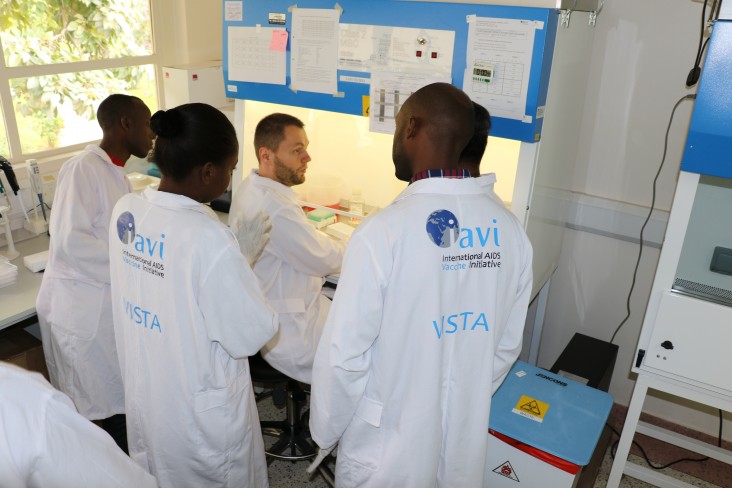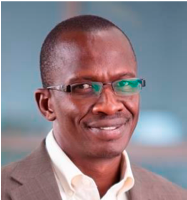- What We Do
- Agriculture and Food Security
- Democracy, Human Rights and Governance
- Economic Growth and Trade
- Education
- Environment and Global Climate Change
- Gender Equality and Women's Empowerment
- Global Health
- Humanitarian Assistance
- Transformation at USAID
- Water and Sanitation
- Working in Crises and Conflict
- U.S. Global Development Lab
Speeches Shim


By Professor Jill Gilmour, PhD
As the Executive Director, Human Immunology and Principal Investigator, IAVI, Human Immunology Laboratory at Imperial College London, Dr. Gilmour is a founder and the Scientific Director of VISTA.

Daniel Ochiel, PhD
Dr. Ochiel is the IAVI Director, Laboratory Program Africa and a lead scientist on the VISTA Program based at the East Africa Regional Office in Nairobi.
Recent Blog Posts
- Paving the Way for African Scientists to Spearhead HIV Vaccine Development
Dr. Daniel Ochiel and Dr. Jill Gilmour - January 30, 2019 - HIV Vaccines Garner Support from the Faith Community in Kayole, Kenya
Ethel Makila - January 30, 2019
Although great strides have been made in HIV treatment to date, with nearly 15 million people receiving antiretroviral therapy through PEPFAR, treatment is not a cure, and much work remains to effectively prevent new HIV infections. Nearly a million people die each year because they don’t know they have HIV, are not on treatment, or start treatment too late. If the new infection rate does not decline quickly enough, the number of people in need of life-long treatment will continue to grow each year. Currently, the rate of new HIV infections is not falling fast enough to reach the target of epidemic control by 2030.
With a surge of new HIV infections expected to impact youth in high HIV burden countries, there is a renewed sense of urgency in developing a vaccine to prevent and eventually end HIV. Developing this vaccine remains the essential tool in halting the spread of HIV.
In 2014, USAID hosted a meeting for global HIV experts on the topic of spurring locally relevant vaccine development. A consensus statement from the event reflected the participants’ desire for self-reliance in HIV vaccine design and development, noting: “Since more than 70 percent of the world’s HIV-infected people live in Eastern and sub-Saharan Africa, these countries with their scientists and clinicians, their universities, and their communities who are rooted in African realities and key regional priorities must fully contribute and eventually lead both the design and testing of sustainable, novel HIV prevention tools.”
As a result of this, USAID started supporting the Vaccine Immunology Science and Technology for Africa (VISTA) consortium [PDF, 1MB], a pioneering initiative that focuses on the scientific pursuit of an HIV vaccine. This collaborative of International AIDS Vaccine Initiative (IAVI) partners provides cutting-edge opportunities and tools to cultivate HIV research and product development by and with African scientists, with support from scientists in India. USAID and IAVI maintain that the key to a safe and globally effective HIV vaccine lies in the continued strengthening of the scientific talent in Africa and the invaluable samples collected over time from study volunteers. [PDF, 570K]
As an integral part of the USAID-supported project ADVANCE [PDF, 570K], VISTA harnesses 17 years of HIV vaccine development work and collaboration between IAVI’s exceptional network of 9 African clinical research center (CRC) partners, the IAVI Human Immunology Lab (HIL), Emory University, and Indian research institutions (including the HIV Vaccine Translational Research (HVTR) Laboratory) to increase African and Indian scientist involvement at all stages of vaccine research and development. This has resulted in a unique collaborative partnership that drives scientific dialogue and collaborative science across 5 African countries.
Building capacity requires a sustained commitment from the ground-up. From supporting promising young scientists and transforming basic facilities into world-class CRCs, to removing barriers through specialized training and equipment, the list of VISTA-driven capabilities at its 9 African CRC partners continues to expand. Thanks to consistent USAID investment and support, the clinical lab capacity at these 9 CRCs is now on par with western labs research centers, enabling them to build sustained capabilities and platforms for future progress.
Through VISTA, a growing number of African scientists actively contribute to the program’s overarching scientific aims and ongoing collaborations with scientists throughout Africa, the U.S., Europe, and India. Strengthened laboratory and analytic capacity in Africa combined with newtools, technologies, and advanced biostatistical and computational methods relevant to the African epidemic empower African and Indian CRC partners to lead HIV vaccine design and assessment contributions. This thoughtful and sustainable capacity expansion has already helped address other urgent unmet public health needs in Africa, including Ebola, tuberculosis (TB), and malaria.
Thanks to USAID’s support of VISTA, innovative scientific advancements are emerging from Africa, including the ”New insights into HIV transmission” study from the molecular virology program, in collaboration with Professor Eric Hunter at Emory University and sites in Uganda, Rwanda, and Kenya. Under the leadership of Professor Pontiano Kaleebu in Uganda, VISTA supported investigators Sheila Balinda (Post-doc, Uganda Virus Research Institute (UVRI)), Anne Kapaata (PhD student, Makerere University), Jesus Salazar (Senior Scientist, UVRI), Gisele Umviligihozo (Projet San Francisco (PSF), Rwanda) and Gladys Macharia (PhD student, Imperial College, London) have conducted this unprecedented full genome sequencing work. In addition to contributing valuable findings to their US and European collaborators, these young scientists are leading the way in developing an HIV vaccine for global use.

Comment
Make a general inquiry or suggest an improvement.